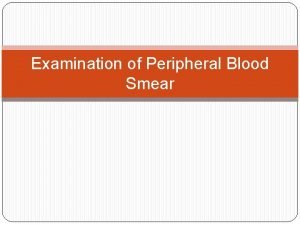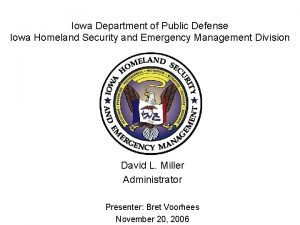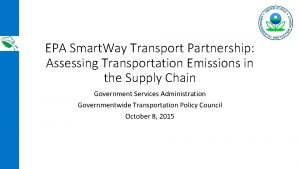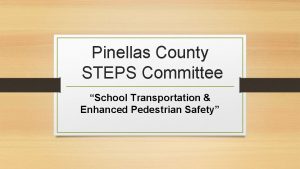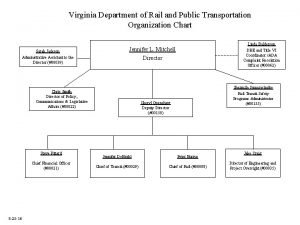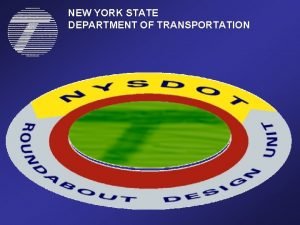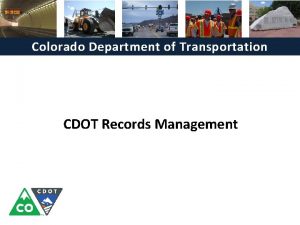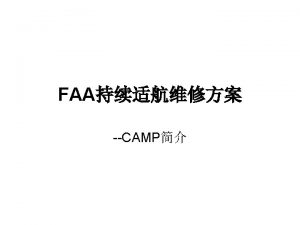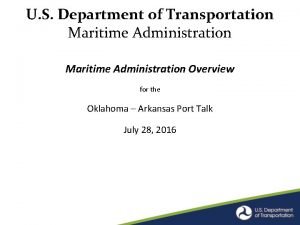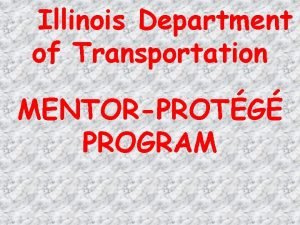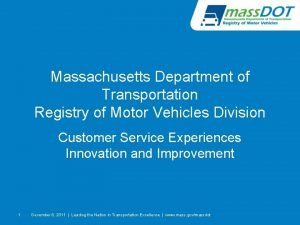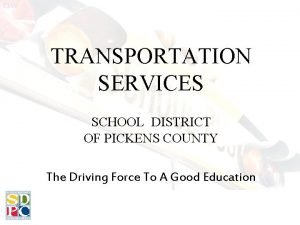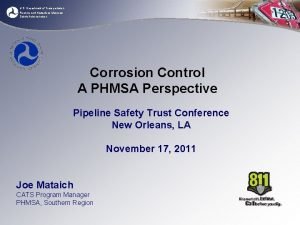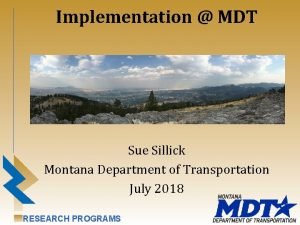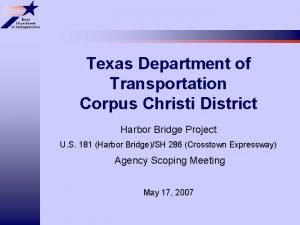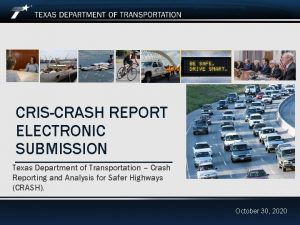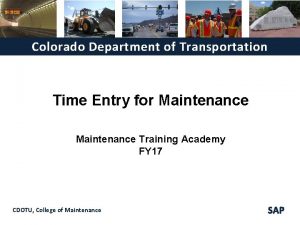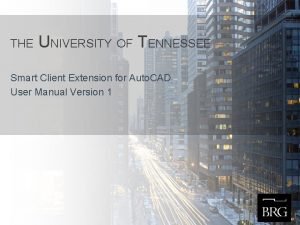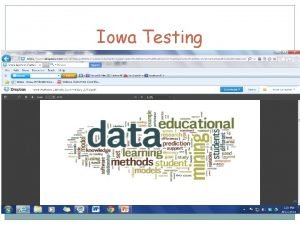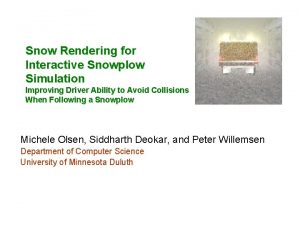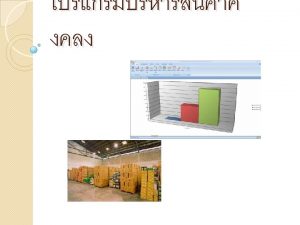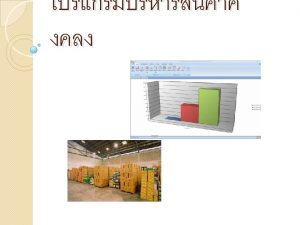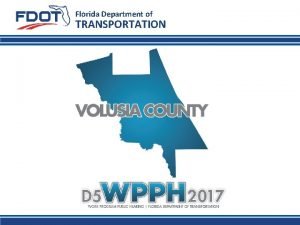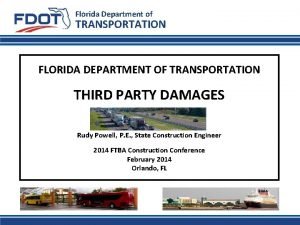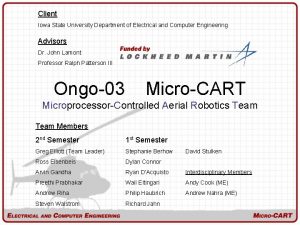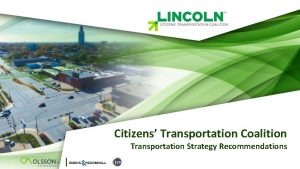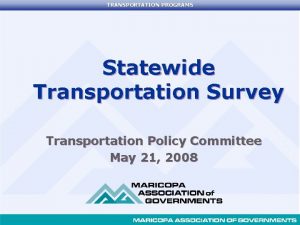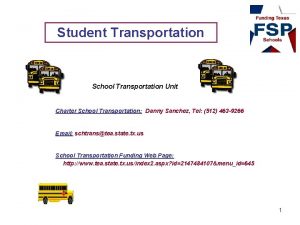Smart Snowplow Client Iowa Department of Transportation Advisors
































- Slides: 32

Smart Snowplow Client Iowa Department of Transportation Advisors John Lamont, Ralph Patterson Team Members Keli Meir, Steve Saltzman, Jason Smolka, Brian Witthoeft Date: 02 – 03 – 2005 May 05 -04

Presentation Outline • • • Introductory materials Subproject descriptions and evaluations Time tables and cost charts Recommendations for future work Q&A Time May 05 -04

List of Definitions • Analog Signal – A signal that can have a varying value • Auger – A rotating threaded tool that moves the salt mixture out of the back of the Snowplow • IDOT – Iowa Department of Transportation • Spreader – The chute and spinning base where the salt mixture exits the Snowplow • Underbody Blade – A plow/blade located underneath the body of the Snowplow • Wing Blade – A plow that is attached to the passenger side of the Snowplow May 05 -04

Acknowledgements • Iowa State University – Duane Smith, CCEE • IDOT – Dennis Burkheimer – Jim Dowd – Bradley Osborne May 05 -04

Problem Statement When a winter storm hits, it is the IDOT’s responsibility to keep roads cleared of snow and ice. There are many complex systems and controls used to operate a snowplow. Difficult road conditions and poor driving habits of others on the road can make safe and efficient operation of a snowplow very challenging. The IDOT would like their snowplows to be easier to operate, safer, and more efficient. Five major areas of improvement have been identified by IDOT snowplow operators and management. May 05 -04

Problem Statement Ctd. 4 5 1 3 2 Target Areas 1) Spreader Detector 2) Blade Wear Detector 3) Blade Position and Display 4) Back Up Sensor 5) Thermal Data Collection May 05 -04

Solution Approach • • • Conduct research on identified areas. Identify adaptable equipment from other industries. Seek advice from outside individuals. Weigh alternatives. Select most practical options. Create final report May 05 -04

Operating Environment • • Freezing temperatures. Heavy vibrations. Snow, sleet and rain Salt (spreader detector). May 05 -04

Intended Uses and Users • Sole User – IDOT • Sole Use – IDOT Snowplows May 05 -04

Assumptions • The operator of each of the Smart Snowplows will receive training and continued operator education. • The improvements being recommended for the Smart Snowplow will be used in the environment and weather of the state of Iowa. • Operators will have a valid operator’s license. • Systems will be used for their intended purpose. May 05 -04

Limitations • The project must provide value proportional to cost in order to be implemented by the IDOT. • Project must be completed by May 2005. • Operator training required to use recommended technology must not exceed four hours. • Training to use thermal mapping systems and import data must not exceed two hours. • All items must function correctly in IDOT operating environments. • Displays and warning devices should not distract driver or interfere with normal plow operation unnecessarily. • Any visual instrumentation must be readable in all lighting conditions. May 05 -04

Selection Criteria • Performance – Will the solution be accurate and dependable? • Economic benefit – Is the solution cost-effective? • Ease of use – Will the solution require extensive training to install or operate? • Maintenance Requirements – What routine maintenance is required? May 05 -04

Spreader Detector • Purpose – To detect when the salt spreader is clogged • Objectives – Flow detection system must detect flow of salt crystals through the auger – System must identify flow to plow operator • Obstacles – Mounting the flow detection system is difficult – If salt builds up right in front of the detector, it may produce a false alarm May 05 -04

Spreader Detector • Progress – Monitor’s ® Microwave Solids Flow Detectors – Senses light and heavy materials, small and large particles – Non-Contact sensor detects flow through most non-metallic surfaces – Non-intrusive flush mounting • There is no probe protruding into material flow – Solids flow indicator provides variable analog signal May 05 -04

Spreader Detector • Plans – Determine cost effectiveness of purchasing such equipment – Determine how to mount equipment onto truck – Present findings to Iowa Department of Transportation for evaluation May 05 -04

Monitor’s ® SFD-2 and SFI Flow Detectors May 05 -04

Spreader May 05 -04

Blade Wear Detection • Purpose – Fully utilize replaceable blade edges – Prevent damage to snowplow moldboards • Objectives – Wear detection system which operates in real-time – Quantify blade wear in at least four increments • Obstacles – Carbide insert only 5/8” – little room for error – Must be adaptable to all blades on plow – Environment – shock and vibration, cold/icy May 05 -04

Blade Wear Detection • Progress – – – Determined eddy current would be ineffective Visible indicator on blade edge not real time Considered semiconductor embedded in carbide Adaptation of disc break wear sensor technology Plans Build prototype to test effectiveness of disposable wear sensor design. Continue to search for other feasible technologies. May 05 -04

Blade Position & Display • Purpose – Increase awareness of positioning of wing and underbody blade. – Remove risk of damage to blades, snowplow, and environment. • Objectives – Create a detection and warning system for the driver. – Display necessary information to the driver. • Obstacles – Display should be easily visible but not distracting. – Display should be visible in all lighting conditions. – Multiple different types of wing and underbody blades May 05 -04

Blade Position & Display • Progress – Clarified expectations from IDOT – Researched technologies in other industries • Plans – Conduct thorough research on linear. hydraulics of snowplows. – Propose options for implementation. – Conduct economic analysis of each option. – Provide recommendation for final report. May 05 -04

Backup Sensor • Purpose – Reduce the number of collisions with snowplows backing into cars • Objective – Create a sensor to allow drivers to avoid cars that pull in behind them • Obstacles – Operation on the back of a snowplow May 05 -04

Backup Sensor • Progress – Initial research on previously tested technologies. – Researched current technologies in use. • Plans – Further research into possible technologies. May 05 -04

Thermal Data Collection • Purpose – Determine effects of snow fences on road surface temperature – Identify low temperature areas on roadway which pose risk of icing • Objectives – Provide fast easy way to determine differences in surface temperature over a stretch of roadway – Interface with existing infrared temperature sensor • Obstacles – Metering distance without being vehicle-dependent May 05 -04

Thermal Data Collection • Progress – Obtained a sensor and serial interface cable for testing – Started writing program to pull temperature data from serial port and graph it – Identified wheel rotation sensor and GPS as potential ways to determine distance • Plans – Complete a basic acquisition and graphing program once other project objectives are met May 05 -04

Project Schedule May 05 -04

Schedule • Project has went thorough several iterations • Initial project definition was too broad • Client was expecting different team makeup • Project redefinition early in project caused major delays • Team is nearly back on track with schedule May 05 -04

Project Costs May 05 -04

Task Time Division May 05 -04

Hours worked (Fall 04) Hours worked during first semester Keli Actual time commitment Predicted time commitment 42. 75 69 Jason 53 67 Steve 62 70 Brian 55. 25 68 Total 213 274 May 05 -04

Recommendations For Future Work • Implementation and testing – Obtain equipment from Monitor ® for testing and evaluation – Actual purchasing and mounting of units for operation – Software for thermal data collection • Improved mechanical work on plow blades • Third party warning system – “This vehicle is only driving 35 mph” • Audible alerts • Electronic control of hydraulics – Obstacle avoidance system – Preset positioning May 05 -04

Questions May 05 -04
 Thin and thick smear
Thin and thick smear Iowa central truck driving school
Iowa central truck driving school Iowa department of health and human services
Iowa department of health and human services Iowa state math department
Iowa state math department Iowa department of public defense
Iowa department of public defense Ryan roemerman
Ryan roemerman Vcloudpoint zero client price
Vcloudpoint zero client price Client lourd vs client léger
Client lourd vs client léger Application layer
Application layer Smart way transportation
Smart way transportation Stephan winter
Stephan winter Pcsb transportation
Pcsb transportation Virginia department of rail and public transportation
Virginia department of rail and public transportation How many roundabouts in new york
How many roundabouts in new york Department of transportation
Department of transportation Department of transportation
Department of transportation Department of transportation
Department of transportation Us department of transportation maritime administration
Us department of transportation maritime administration Department of transportation
Department of transportation Massachusetts department of motor vehicles
Massachusetts department of motor vehicles Pickens school bus office
Pickens school bus office Maricopa county department of transportation
Maricopa county department of transportation Phmsa okc
Phmsa okc Seminole transportation
Seminole transportation Montana department of transportation
Montana department of transportation Department of transportation
Department of transportation Texas department of transportation corpus christi
Texas department of transportation corpus christi Criscrash
Criscrash Department of transportation
Department of transportation Archibus smart client
Archibus smart client What is the next letter? a z b y c x d
What is the next letter? a z b y c x d Interserf
Interserf Street smart vs book smart quotes
Street smart vs book smart quotes
